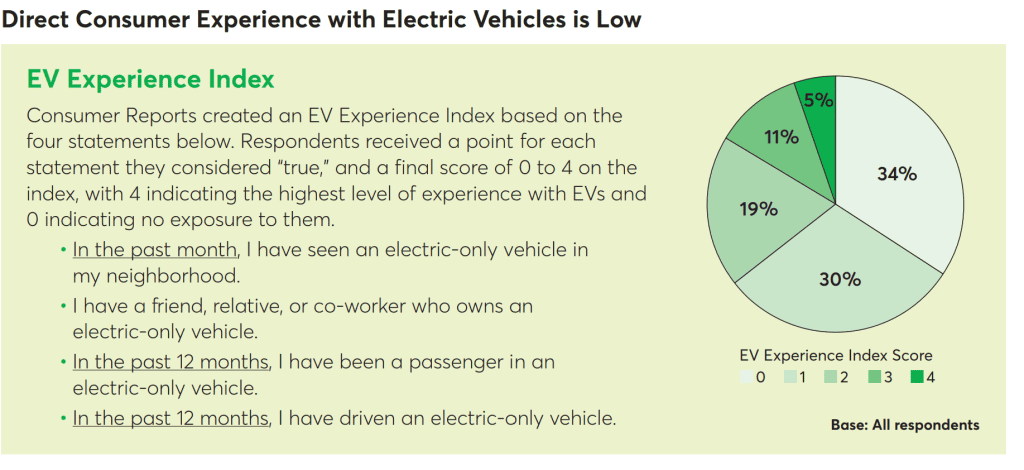
Electric Vehicles
The survey finds that around seven in ten Americans express some level of interest in buying or leasing an electric-only vehicle (EV). This is consistent with the results from a similar survey fielded by CR in 2022.
Among Americans who said they expect their next vehicle to be new, 38% said they would at least seriously consider getting an EV if they were to get a vehicle today. This however highlights a significant gap between consideration and actual purchases, as only around 7% of new vehicle purchases in 2023 were battery electric vehicles.
Deeper analysis of the survey findings showed that overall consumer experience with EVs is very low. Consumer Reports developed an EV experience index on a scale of 0 to 4 based on answers to a series of four survey questions, ranging from whether they have seen an EV in their neighborhood to whether they have driven one. Only 5% of Americans score a 4 on the EV Experience Index, meaning they had had all four experiences we asked about, while 64% of Americans score a 1 or less.
CR’s analysis also shows that willingness to get an EV increases as EV experience scores increase. This relationship remains statistically significant even when controlling for demographics and EV ownership history. Among Americans who scored a 4 on the experience index, 71% said that they would at least seriously consider getting an EV if they were to get a vehicle today. Conversely, only 13% of Americans who scored a 0 on the experience index said they would at least seriously consider getting an EV today.
“Right now it appears that lack of experience with EVs may be acting as a bit of a brake on EV adoption,” says Chris Harto, senior sustainability policy analyst at Consumer Reports. “However, the data seems to be showing that once more consumers get some first hand experience with EVs, demand could accelerate swiftly.”
The survey also found low awareness of existing EV incentive programs:
- Only 47% of Americans are aware of tax credits available for the purchase or lease of new EVs.
- Only 19% of Americans are aware of tax credits available for the purchase or lease of used EVs.
However, 48% of Americans said that tax rebates or discounts at the time of purchase (or lease) would encourage them to get an EV. These findings indicate that improving awareness of existing EV incentive programs could improve their effectiveness at increasing EV sales.
Low Carbon Fuels
The survey asked consumers about their perspectives and awareness of low carbon fuels (LCFs). Prior to taking the survey, only 25% of Americans had heard of low carbon fuels in vehicles. Once they learned about the fuels, 63% of Americans said they would at least somewhat likely use LCFs in their personal vehicles if the price was the same as traditional fuel.
Among the Americans who said they would be at least somewhat likely to use LCFs in their own vehicle, the two most commonly selected factors that contributed to this willingness were beliefs that low carbon fuels create less pollution than traditional fuels (64%) and that low carbon fuels have lower greenhouse gas emissions than traditional fuels (58%). One third of them say that they see LCFs as a stepping stone between traditional fuels and going fully electric (33%).
Additionally, we asked about LCF policies that would require clean fuel producers to invest in projects that serve low-income and disadvantaged communities, with 62% of Americans saying they would support these programs.
“Overburdened communities are at the forefront of the climate crisis and, from a consumer perspective, have the most to benefit when it comes to transitioning to cleaner, lower-emission technologies,” said Dylan Jaff, policy analyst at Consumer Reports. “In order to support communities and increase access to clean transportation technology, policies must be targeted to prioritize equity and environmental justice, and consumers agree.”
Sustainable Aviation Fuel
When asked if they would choose a flight on a plane that uses sustainable aviation fuel, or SAF, if the cost of a ticket was the same as flying a plane that uses traditional fuel, 56% of Americans said they would be at least somewhat likely to choose the SAF alternative.
Of the 20% of Americans who said they would be unlikely to fly on a plane that uses SAFs, the common responses when asked why not were related to safety or reliability, with 47% stating that they wouldn’t trust planes that fly on SAFs would be as safe, and 45% stating that they wouldn’t trust the reliability of the service of planes that fly on SAFs given the new technology.